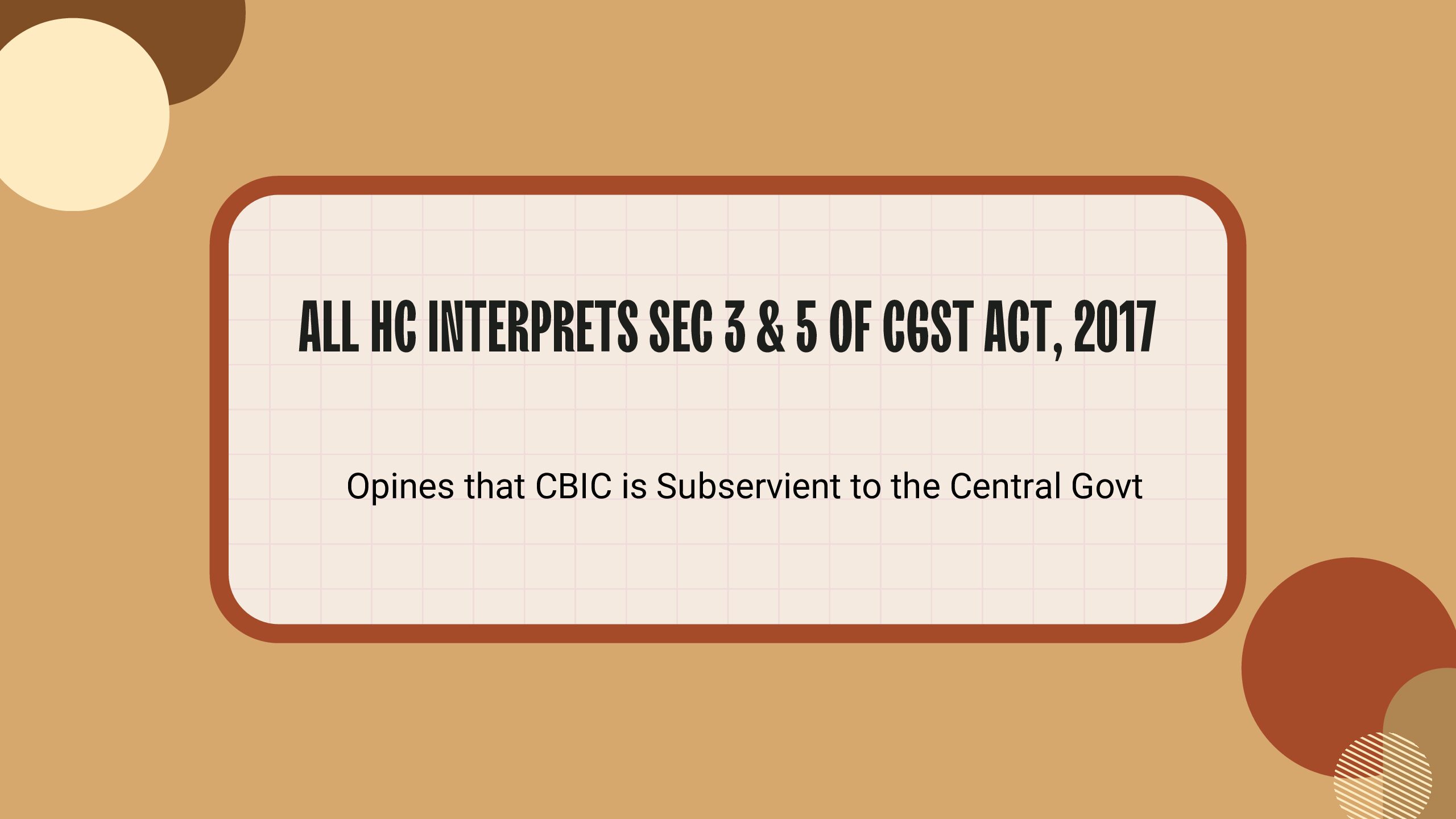In a recent decision[1], the Allahabad High Court interpreted Sections 3 and 5 of the CGST Act, 2017 and clarified the scope of power of the Central Govt and the CBIC under these provisions. Section 3 confers the Central Govt with the power to appoint classes of officers for the purposes of CGST Act, 2017. Section 5 provides that officer of central tax may exercise powers and discharge duties subject to such conditions as the CBIC may impose. The High Court rejected petitioner’s argument that the Central Govt does not have the authority to confer powers on the officers under Section 5 and observed that the petitioner’s contention lacked substance.
Facts
The petitioner invoked extraordinary writ jurisdiction of the Allahabad High Court challenging Notification No. 14/2017 – Central Tax dated 01.07.2017 on the ground that it was ultra vires to the power of the Central Govt. The petitioner also made additional arguments about the jurisdiction of the concerned officers to carry out inspection/search proceedings under Section 67 and power to issue summons. I will though confine this post to the petitioner’s first argument involving power of the Central Govt and CBIC under Sections 3 and 5 of CGST Act, 2017.
According to the petitioner, the Central Govt in exercise of its powers under Section 3 has issued the Notification No. 14/2017 – Central Tax wherein it has appointed officers of Director General of Goods and Services Tax Intelligence (‘DGSI’) as Central Tax Officers and invested them with all the powers under CGST Act and IGST Act. The petitioner contended that appointing officers does not confer them with powers and the latter was outside the remit of the Central Govt’s powers under Section 3. The petitioner’s case was that only the Commissioner in Board can confer powers to Central Tax Officers under Section 5 read with Section 167 and Section 168.
The relevant statutory provisions are worth citing before examining the Allahabad High Court’s reasoning and its decision. Section 3, CGST Act, 2017 states that the Central Government shall, by notification, appoint the following classes of officers for the purposes of this Act. The classes of officers include the Principal Chief Commissioners or Directors General of Central Tax, Principal Commissioners of Central Tax or Directors General of Central Tax among others. Section 5 states that subject to such conditions and limitations as the Board/CBIC may impose, an officer of central tax may exercise the power and discharge the duties conferred or imposed on him under this Act.
Simply put, the petitioner was arguing that the Central Government could only appoint certain officers as central tax officers while conferring them with powers could be done by the Board/CBIC under Section 5. Since the Notification No. 14.2017 – issued by the Central Govt – also performed the latter function, it was ultra vires Sections 3 and 5 of the CGST Act, 2017. Ironically, the said Notification was previously issued by CBIC and later via a corrigendum it was substituted by the word Central Govt.
Decision
The Allahabad High Court stated that the petitioner’s argument lacked substance. It traced the timeline relating to Notification No. 14/2107 – Central Tax and wording of Sections 3,4, and 5 of CGST Act, 2017. The High Court agreed with the petitioner’s contention that it was essentially the CBIC which had been empowered to entrust the power to the officers under Section 5, CGST Act, 2017. The High Court though treated the CBIC as an extension of the Central Govt. Referring to the constitution of CBIC, the High Court observed that it was constituted under Central Boards of Revenue Act, 1963 and that:
Further, section 3 of the Central Boards of Revenue Act, 1963 relating to Constitution of Central Boards for Indirect Taxes and Customs says that it is the Central Government, which shall constitute the Central Board of Indirect Taxes and Customs and the said Board shall be subject to the control of the Central Government and shall exercise such powers and perform such duties, as may be entrusted to that Board by the Central Government or by or under any law. (para 18)
The High Court concluded that it appears that the CBIC is subservient to the Govt and it can be argued that when the power has been invested with CBIC to do certain things, how can the Govt not exercise such a power. (para 18) The CBIC is to be understood as an alter ego of the Central Govt?
Conclusion
The necessary corollary of the High Court’s decision is that any power conferred on CBIC can be exercised by the Central Govt and more crucially, this could also mean that CBIC lacks autonomy. Undoubtedly, CBIC is a creation of the Central Govt under a statutory provision, but that cannot necessarily lead to the conclusion that the powers of CBIC are exercisable by the Govt in all cases and for all purposes. An analogy would be that a sectoral regulator such as RBI or SEBI is a creation of the statute, but that does not mean that any power of these statutory bodies can be exercised by the Central Govt. The Govt does has the power to supplant a statutory body only in exceptional or specified circumstances. And if CBIC and the Central Govt are to read interchangeably, what is the point of mentioning one and not the other in certain provisions?
[1] R.C. Infra Digital Solutions Inc v Union of India TS-02-HCALL-2024-GST.
